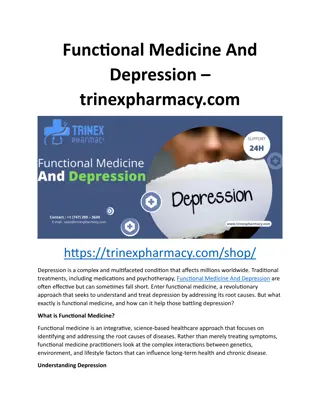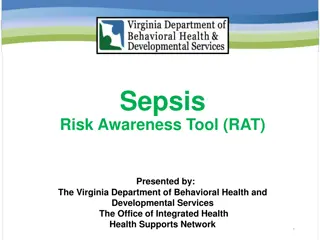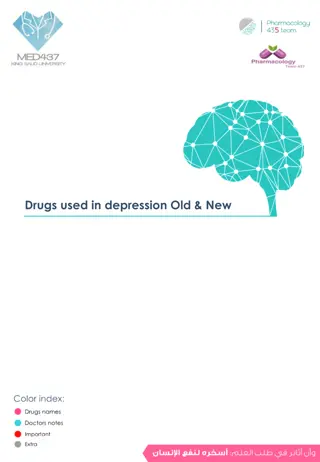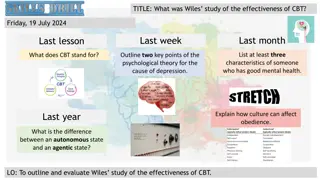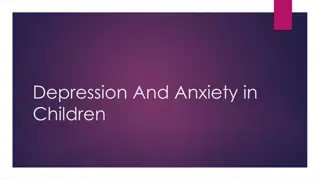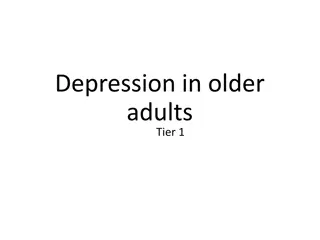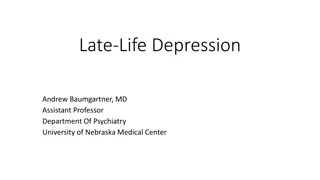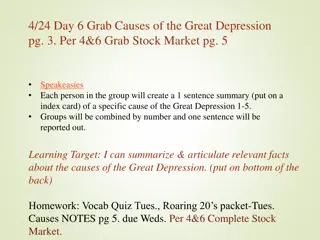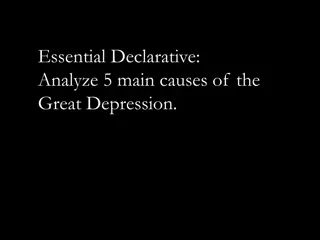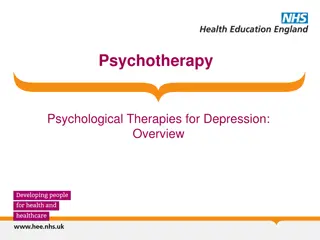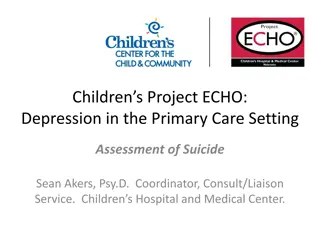Understanding Depression: Causes, Risk Factors, and Symptoms
Depression is a serious illness influenced by various factors such as brain chemistry, genetics, and life circumstances. This presentation explores the causes, risk factors, and symptoms of depression to raise awareness and promote discussion on a sensitive topic. It provides insights into identifying and understanding the signs of major depressive episodes, including mood changes, loss of interest in activities, weight fluctuations, sleep disturbances, and feelings of worthlessness. By shedding light on these aspects, the aim is to encourage proactive measures and support for individuals affected by depression.
Download Presentation

Please find below an Image/Link to download the presentation.
The content on the website is provided AS IS for your information and personal use only. It may not be sold, licensed, or shared on other websites without obtaining consent from the author. Download presentation by click this link. If you encounter any issues during the download, it is possible that the publisher has removed the file from their server.
E N D
Presentation Transcript
STEP UP! DEPRESSION AND SUICIDE
Setting the Tone: This presentation is meant to promote thought and discussion. I recognize that the sensitive or personally- relevant material presented may generate an emotional reaction for you and the participants around you. Therefore, I ask that you remain mindful of these sensitivities.
CAUSES OF DEPRESSION Depression is more than just feeling down. It is a serious illness illness serious Research tells us that factors contribute to the onset of depression, including: changes changes in brain chemistry genetics changes changes in hormone level certain medical conditions stress grief grief or difficult life circumstances.
RISK FACTORS FOR DEPRESSION Significant stressful events Pressure in the environment Injury or other medical conditions Identity issues Failure to live up to personal or external expectations Problems with parents/friends/family/romantic partner Substance abuse Trouble in school; being expelled from school Loss of any major relationship, including through death
SYMPTOMS OF A MAJOR DEPRESSIVE EPISODE 5 or more of the following 9 symptoms nearly every day for at least 2 weeks. 1. Depressed mood* [or irritability] 2. Markedly diminished interest or pleasure in activities* *One of these must be present
DIAGNOSTIC CRITERIA, CONTD 3. Significant weight loss (w/o dieting) or gain or increase or decrease in appetite 4. Insomnia or excessive sleep 5. Physically agitated or slowed down 6. Fatigue or loss of energy 7. Feelings of worthlessness or excessive or inappropriate guilt 8. Diminished ability to think or concentrate; or indecisiveness 9. Recurrent thoughts of death or suicidal ideation
KEY POINTS ABOUT SUICIDE If you have a feeling that a person may be thinking about suicide, you should ask about it. Asking about suicidal thoughts will not put ideas into a person s head. If you are concerned enough to ask, it s likely that the person has already thought about it. Asking someone about possible suicidal thoughts opens up communication and reduces the risk of an impulsive act. Suicide is preventable. You don t have to be a mental health professional to save a life. Initiating conversation is key.
RED FLAGS FOR EMOTIONAL DISTRESS (OTHER THAN DIAGNOSTIC CRITERIA FOR DEPRESSION) Mood swings; impulsive acts; reckless behavior. Neglect of personal care. Making negative remarks about one s self, one s life, or the future. Reports of feeling misunderstood or rejected. Poor coping skills. Withdrawing from friends/family. All-or-nothing thinking. Marked decrease in academic or athletic/extracurricular activities. Intentional self injury. Giving away possessions. Making comments about no longer being around.
WHAT TO DO: Have a safety plan before beginning the conversation. Describe specific situations or behaviors that concern you. Keep your statements brief. Reflect feelings. Help them to begin to contemplate that a change is needed. Avoid labels, judgments, or critical statements LISTEN find out what is going on in their lives. Repeat (1) the evidence, (2) your concern, and (3) that you feel strongly that they need to seek help
WHAT NOT TO DO: Don't be afraid to ask about suicidal thoughts. Don t give simplistic solutions. Don't keep secrets. Don't gossip. Don tassume that this is a one-time conversation.
HOW TO REFER Explain that you are concerned, that you want to be supportive, and that there is wisdom in soliciting the help of someone with expertise. Give positive reasons for your referral. Try to point out the benefits of counseling and working toward behavior change or self-improvement. Indicate that a counselor may help him or her work through the situation more effectively. Even suggesting an appointment just to check it out can make a difference.
WHAT IF I GET A HESITANT OR NEGATIVE RESPONSE? Ask why they object to seeing a counselor. Respond to those concerns Encourage a one-time visit, And if you don t see any potential benefit from seeing the counselor again, you don t have to schedule a second. Ask, What have you got to lose?
WHAT IF A DEPRESSED, BUT NON- SUICIDAL, PERSON REFUSES HELP? Convey your ongoing concern and your willingness to offer support in the future. The person might not want to burden you. The person may prefer to talk a friend or family member rather than a counselor. In any of these cases, follow-up in the coming days.
WHAT IF A SUICIDAL PERSON REFUSES HELP? Explain that you are deeply concerned by what they have shared with you. State that you cannot, in good conscience, leave them alone after this conversation. Explain that because you care so much about the other person that you are going to need to take steps to keep them safe. Offer to take the person to the nearest hospital emergency room for a professional assessment; or call 911, go directly to social work, tell their parents. Do something!!!!
THREE ROLE PLAYS Spread out, if possible. Three rounds with approximately 5 minutes of role-play for each scenario. One person is the depressed person, one person is stepping up out of concern, and one person is the observer. Rotate roles after each scenario.
SCRIPT FOR INTERVENTION: I CARE I SEE I FEEL I WONDER I WILL Repeat (1) the evidence, (2) your concern, and (3) that you feel strongly that they need to seek help
DEBRIEFING EACH ROLE PLAY: 5 MINUTES Between scenarios, you will debrief the role play in the following way: For the intervener: How did it feel to step up? What did you say/do that you thought was effective? Was there anything that you would have done a bit differently if you were to do this role play again? For the depressed student: How did it feel to be helped? What was particularly helpful? What might have helped to make this exchange even more helpful? For the observer: What did you see/hear that you thought was helpful? Is there anything else that might have made this exchange even more helpful?
SCENARIO #1 Your friend s parents are getting divorced, and their mom recently told them that they re selling the house they grew up in. You ve heard them crying a number of times, and their have been drinking a lot more than usual. They seem irritable a lot of the time and wrestles with insomnia. They have made comments that their to blame for their parents struggles, and said that it would be better if they weren t around. What do you do?
SCENARIO #2 Your teammate has been reacting slowly on the court for the past month. Their concentration seems off, and you re beginning to worry that these changes could cause an injury. In addition, you notice that they have been wearing the same t-shirt and jeans nearly every day for the past two weeks and has been on the phone with their parents every time you ve seen them. All of this is highly unusual, as they are usually on point, social, and well-groomed. What do you do?
SCENARIO #3 A friend of yours recently broke up with their romantic partner. They have seemed down lately and has told you that going to practice and being with the team just isn t as fun as it used to be. They nap a lot and misses class sometimes. You notice that they picks at their food during lunch and often says their not hungry. When you have invited them to do things with you lately, they have declined. What do you do?
DEBRIEF (5 MINUTES) For the intervener: How did it feel to step up? What did you say/do that you thought was effective? Was there anything that you would have done a bit differently if you were to do this role play again? For the depressed student: How did it feel to be helped? What was particularly helpful? What might have helped to make this exchange even more helpful? For the observer: What did you see/hear that you thought was helpful? Is there anything else that might have made this exchange even more helpful?
LARGE GROUP DEBRIEF Reconvene as a larger group to discuss what it was like to step up and what it was like to be helped. What themes emerged? What were the major take- aways from this role-play series?




